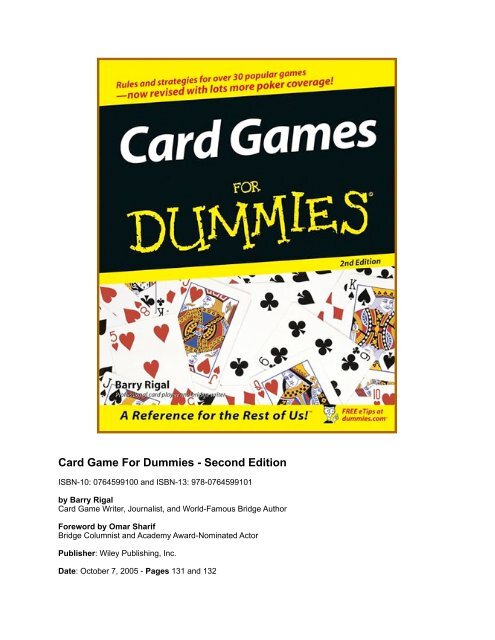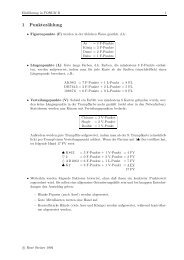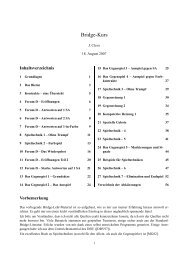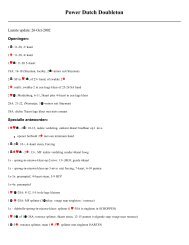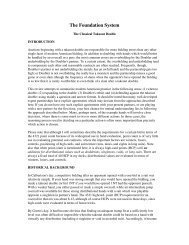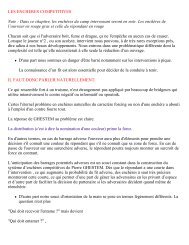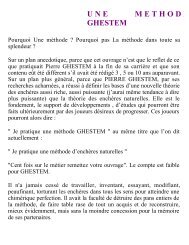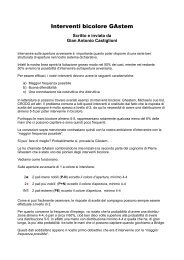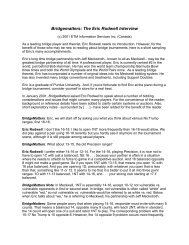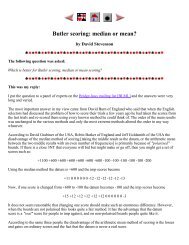Card Game For Dummies - Second Edition - Bridge Guys
Card Game For Dummies - Second Edition - Bridge Guys
Card Game For Dummies - Second Edition - Bridge Guys
You also want an ePaper? Increase the reach of your titles
YUMPU automatically turns print PDFs into web optimized ePapers that Google loves.
<strong>Card</strong> <strong>Game</strong> <strong>For</strong> <strong>Dummies</strong> - <strong>Second</strong> <strong>Edition</strong><br />
ISBN-10: 0764599100 and ISBN-13: 978-0764599101<br />
by Barry Rigal<br />
<strong>Card</strong> <strong>Game</strong> Writer, Journalist, and World-Famous <strong>Bridge</strong> Author<br />
<strong>For</strong>eword by Omar Sharif<br />
<strong>Bridge</strong> Columnist and Academy Award-Nominated Actor<br />
Publisher: Wiley Publishing, Inc.<br />
Date: October 7, 2005 - Pages 131 and 132
German Whist (Two-Handed) Whist<br />
German Whist is a game for two players, which may explain why the game is also referred to<br />
as Honeymoon Whist. If you decide to play this game on your honeymoon, you must be very<br />
devoted card players.<br />
The dealer deals 13 cards to each player and turns over the top card of the remaining 26, of<br />
the stock. This card defines the trump suit for the whole hand (refer to the section “Winning<br />
tricks with the trump suit” earlier in this chapter for more information).<br />
The game progresses in two stages: the preparation stage and the actual play of the hand,<br />
although the nature of the two stages may seem pretty similar.<br />
Improving your holding cards<br />
During the preparation stage, you attempt to improve your hand by playing out cards and<br />
receiving cards in return. Both players fight for the right to pickup either the face-up card<br />
or the face-down card of the stock. Depending on whether the face-up card is a good or<br />
bad card, you try to win the trick or lose it.<br />
The nondealer may lead any card in her hand, and the dealer must follow suit. The winner<br />
of the trick takes the face-up card on the discard pile; the loser takes the face-down card<br />
from the top of the stock. You turn up a new card and repeat the process. The winner of<br />
the previous trick leads, and you repeat this process 13 times.<br />
Part III: Taking Tricks<br />
This procedure is all preparation, because these 13 tricks don’t count for anything toward<br />
the scoring of the hand. They just set you up for the finale.<br />
Not that I’m encouraging you to cheat, but one of the problems with the traditional game I<br />
describe is that it’s frequently impossible to detect a revoke. Say you lead the ace of trumps<br />
early on in the hand and instead of dropping my singleton king, I throw a card from another<br />
suit. How will you know? The only way around this is to be trusting, or ethical, or to vary the<br />
basic rules of the game to score for all 26 tricks, but not to require suit to be followed until<br />
the last 13.<br />
Playing the hand<br />
Now the serious part of the game begins. During this final stage, you want to win as many of<br />
the 13 tricks you play as possible. You keep the same trump suit you had for the fist 13 tricks,<br />
and you play out the cards one at a time. The player who wins the last trick of the preparation<br />
phase leads first, and the other player responds by playing a card, following suit if she can.<br />
The winner of the trick leads to the next trick, and play continues this way for all 13 tricks.
German Whist offers a great test of memory as you try to keep track of what happened in the<br />
initial phase of the game and who ended up with which cards. Try to keep track of all the aces,<br />
kinds, and queens at the very least, so that as the preparation stage comes to an end, you can<br />
lead middle cards out and force a high card from your opponent’s hand.<br />
<strong>For</strong> example, say that the top card you’re playing for is the ♣7, and clubs are the trump suit.<br />
If you have the ♥10 and the ♥9, and the ♥K and ♥Q have already been played, leading the<br />
♥10 may force your opponent to relinquish her ♥A if she want the trump card (♣7). Of course,<br />
she may have the ♥J.<br />
Don’t try to win tricks during the preparation phase of the game unless you want the top card.<br />
Try to weigh how good the card you led is against the top card. Don’t, for example, lead an ace<br />
just to get a king of the same suit. because you simply exchange a good card for another one.<br />
This move also gives your opponent a chance to throw a card of his choice in the suit led. - and<br />
what if she picks up something good in exchange?<br />
You may want to lead trump cards in the early stage to kill, or reduce the effectiveness of your<br />
opponent’s hand. This tactic may prove particularly relevant if you believe that your enemy has<br />
trump-card control as the preparation state of the game runs down. You may also want to get rid<br />
of a particular suit (other than trump) in the early part of the game so you can trump when your<br />
opponent leads that suit to win a key card.


